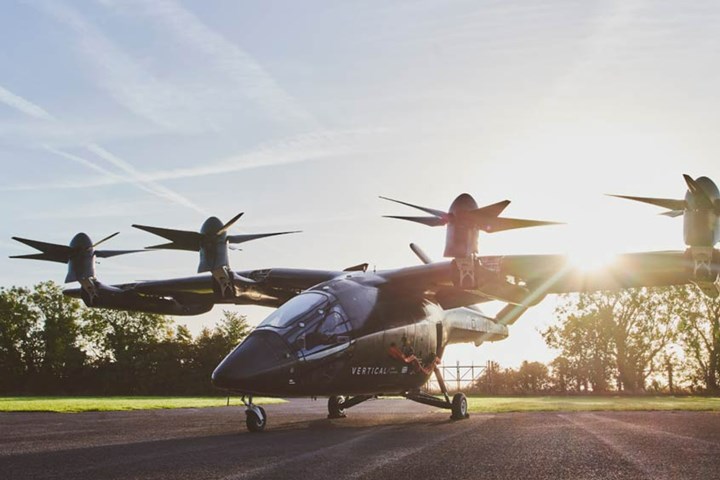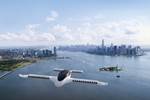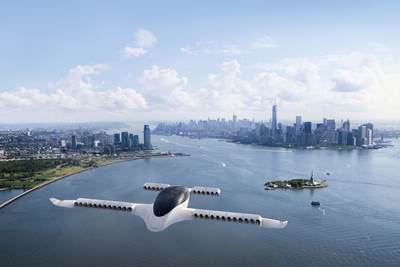Vertical Aerospace announces Design Organisation Approval (DOA)
Issued by the U.K. Civil Aviation Authority (CAA), this marks a step toward Type Certification for the company’s VX4 eVTOL aircraft.

Photo Credit: Vertical Aerospace
Zero-emissions aviation and technology company (Vertical, London, U.K.) announced on March 30 that it has secured the first ever Design Organisation Approval (DOA) issued to an electrical vertical takeoff and landing (eVTOL) manufacturer by the U.K. Civil Aviation Authority (CAA).
According to Vertical, this is a milestone toward achieving Type Certification for its VX4 eVTOL aircraft. U.K. and European aerospace companies must be granted a DOA before holding a Type Certificate, the company says. The DOA authorizes Vertical to conduct design activities and issue design approvals within the DOA’s scope of approval. As an approved Design Organisation, Vertical says it will have increasing authority and privileges as it progresses through the design and certification program of the VX4. This approval means the CAA is satisfied that Vertical has the capability to design a safe and reliable aircraft and aviation-related products to the highest standards.
The process for achieving DOA involved a rigorous assessment of Vertical’s procedures, its quality management system, the competence of its technical workforce, and the necessary facilities and equipment to support the design activities to certify the VX4 aircraft.
In addition, earlier this month, the CAA announced its intention to adopt European Union Aviation Safety Agency’s (EASA) Means of Compliance to SC-VTOL, the standards against which European and now U.K. manufacturers will design eVTOLs. Vertical continues working closely with the CAA on the Type Certification of its VX4 aircraft, having recently submitted its certification basis proposal to the regulator.
Vertical says both of these steps provide regulatory clarify on the requirements for its VX4 aircraft, and the company will continue discussions with the CAA in the coming months.
“This approval is a critical step forward in our mission to decarbonize air travel and bring the U.K.’s first electric aircraft to market. We are grateful for the CAA’s commitment to advancing sustainable aviation, which allows us to build on the U.K.’s proud aerospace tradition,” says Stephen Fitzpatrick, Vertical’s founder and CEO.
“I believe that in formally working with JCAB, as the fourth aviation regulator Vertical is committed to certifying with, we are on track for establishing the most detailed understanding of global regulators’ needs and differences for eVTOLs. This will give us a competitive edge in bringing the VX4 into service,” adds Paul Harper, Vertical’s head of certification.
“The granting of Design Organisation Approval to Vertical is an essential step on their journey bringing an eVTOL aircraft into service. It emphasizes our commitment to making the U.K. a key destination for aviation innovators,” says Garry Lathey, design and certification manager at the CAA.
Aiming for international service, Vertical says it is also in discussions with the National Civil Aviation Agency of Brazil and the U.S. Federal Aviation Administration (FAA).
Vertical has also formally commenced its certification efforts in Japan, following the Japan Civil Aviation Bureau’s (JCAB) acceptance of the VX4’s validation program. Successful validation of the VX4’s Type Certificate will allow the aircraft to be operated in this market. Vertical has also partnered with Japan Airlines (JAL), through the placement of up to 100 VX4 pre-orders with Avolon, as well as with Marubeni Corp. for up to 200 VX4 preorders. In January 2023, Marubeni made a pre-delivery payment to Vertical for the reservation of its first 25 VX4 aircraft delivery slots out of the 200 VX4 conditional pre-orders. In March 2023, it was announced that Marubeni would be one of the operators of the Advanced Air Mobility showcase for the 2025 Osaka World Expo to fly with Vertical’s VX4.
Related Content
Aerospace prepregs with braided reinforcement demonstrate improved production rates, cost
A recent time study compares the layup of a wing spar using prepreg with A&P’s TX-45 continuous braided reinforcement versus traditional twill woven prepreg.
Read MoreWhat you might have missed at Paris Air Show 2025
A surge in defense spending, partnerships in hydrogen propulsion and new combat aircraft agreements, many backed by composites industry leaders, culminated the 55th Paris Air Show.
Read MoreJoby demonstrator makes 523-mile hydrogen-electric flight
Hydrogen-electric program builds on technology developed by H2FLY subsidiary, demonstrates potential for emissions-free regional travel using Joby’s all-composite eVTOL aircraft.
Read MoreArcher completes construction of high-volume manufacturing facility for Midnight eVTOL aircraft
Tooling load-in is already underway ahead of the planned start of initial production beginning early 2025, while Stellantis and Archer work to finalize the exclusive contract agreement.
Read MoreRead Next
Composite aerostructures in the emerging urban air mobility market
In the not too distant future, point-to-point, limited-distance, piloted and autonomous air travel for people and cargo will be the norm. Composites will make it possible.
Read MoreScaling up, optimizing the flax fiber composite camper
Greenlander’s Sherpa RV cab, which is largely constructed from flax fiber/bio-epoxy sandwich panels, nears commercial production readiness and next-generation scale-up.
Read MoreUltrasonic welding for in-space manufacturing of CFRTP
Agile Ultrasonics and NASA trial robotic-compatible carbon fiber-reinforced thermoplastic ultrasonic welding technology for space structures.
Read More.jpg;width=70;height=70;mode=crop)












